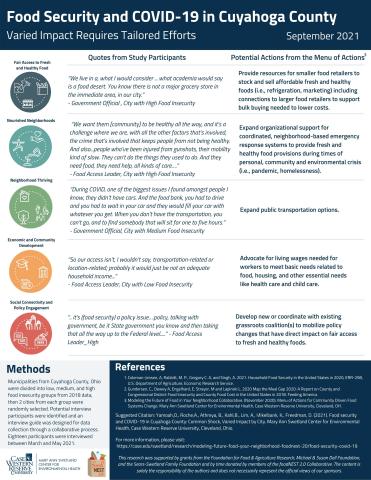Study Overview
The Food Security and COVID-19 Study is a supplement to the Modeling the Future of Food in Your Neighborhood study (foodNEST 2.0). Supported by the Foundation for Food and Agricultural Research (FFAR), this supplement was launched to better understand how a system shock, like COVID-19, impacts economic opportunity, food security, and fair access to fresh and healthy foods in communities with varying levels of food insecurity.
The Food Security and COVID-19 supplement found that the pandemic shed light on enduring food security problems in Cuyahoga County and that, despite a common shock like COVID-19, food initiatives require tailored interventions to the unique environment of each community. Furthermore, the study found that the pace at which we achieve community vitality in the wake of the pandemic depends on whether we deploy strategies that fully tackle the reality and the root causes of food insecurity. This data brief contains suggested actions that communities can take to tackle the reality and the root causes of food insecurity.
For more information regarding other COVID-19-related work, please visit the Ohio COVID-19 Child Care Study.
Launched in early 2021, data collection is expected to continue throughout Spring 2021, and study results are expected to be released in Summer 2021. Study participants will include key policy, food access, and community leaders involved in the food system in 6 municipalities of Cuyahoga County. Study results can be found in this data brief.
1. How does COVID-19 impact food security in cities that had high, medium, and low levels of food insecurity prior to the pandemic (2018)?
2. What are the tradeoffs to different COVID-19 response strategies on food security among residents living in cities with different levels of food security before the pandemic?
FAQ'S
Background and Overview
The Principal Investigator is Dr. Darcy Freedman, Swetland Professor of Environmental Health Sciences and Director of the Mary Ann Swetland Center for Environmental Health at Case Western Reserve University.
This is a supplemental study designed to build upon the Modeling the Future of Food in your Neighborhood Study, which investigates the multiple interacting and dynamic components of the local food system, and explores the impact of strategic investments on community health and economic development.
The goal of this study is to better understand the impact of a shock such as COVID-19 on economic activity, food security, and fair access to fresh and healthy foods. This study also extends two years of participatory system dynamics modeling conducted in partnership with our Core Modeling Team (i.e., 20 community and organizational leaders) and the Cleveland-Cuyahoga County Food Policy Coalition. The research will be grounded within the context of multiple tipping points in the local food system throughout Cleveland.
The study is funded by the Foundation for Food and Agriculture Research. To learn more about this study and other programs supported by the Foundation for Food and Agriculture Research please visit:
https://foundationfar.org/news/ffar-funds-emergency-research-to-address-coronavirus/
Study Components and Timeline
As a qualitative study, the key study activities involved recruiting participants, conducting interviews, analyzing data and disseminating materials and key findings.
The collected data will be used for 2 key objectives:
1) System modeling to simulate the shock of COVID-19 on local food system dynamics and evaluate how these dynamics impact household food security in urban neighborhoods with different starting points for neighborhood-level economic opportunity, food insecurity, and access to fresh and healthy foods;
2) Simulating different food system solution scenarios (i.e., emergency food assistance, online purchasing, increasing SNAP) in response to COVID-19 and evaluating the tradeoffs of these on economic opportunity, food security, and fair access to fresh and healthy foods in historically redlined urban neighborhoods.
The study began data collection in February 2021. All publications and dissemination materials will be released upon study completion.
No. All interactions with the study team will be conducted virtually, through e-mail, Zoom, or phone call.
Participation and Opt-Out
All study participation is voluntary. Participants are free to quit the study at any time. In addition, participation in this study should not interfere with participants’ daily schedules. All components of the study will make best efforts to accommodate schedules and availability.
Food Insecurity
Please feel free to reach the study team at foodnest@case.edu.


